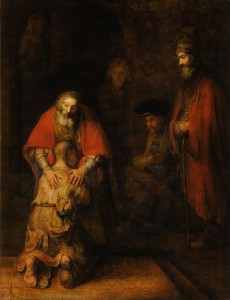a sermon on Isaiah 64:1-9 and Matthew 13:31-35, 44-50
preached on August 21, 2016, at the First Presbyterian Church of Whitestone
As I’ve been preparing to leave New York over the past month or so, I’ve been doing everything I can to tie up all the loose ends swirling around in my life. But with less than two weeks remaining before the moving van comes to move me to North Carolina, I am realizing that there are some things that are just going to be left undone—there will be some unfinished business in my life and work as I move on to the new things ahead.
The biggest bit of unfinished business I will leave behind in the church is going on right on the other side of this wall in the space once known as the auditorium. As construction began a few weeks on our project to enhance the accessibility of our building and create new space for our children to learn, I got excited—it looked like I might actually get to see this work finished! This work is a major achievement in the life of this congregation. We have been talking about doing some sort of accessibility project for basically the entire eleven years that I have been pastor here—and I know that the conversation actually probably began eleven years or more before that!
But as the weeks have worn on and the work went slower than expected, it became clear that this too would be unfinished business for me. There are too many things still to be finished for all the work to be complete before my last day in the office on Thursday! And yet as I was talking with Lena Ronde about this the other day, I realized that this is like so much of my ministry in this place. I am not going to see things finished in the way I would like. The projects and work that we have begun together here to live out the mission of God in our midst will take new shape and form and direction in the days after I leave, and I cannot control that. I am leaving a lot of unfinished business—more than I would like—for you and your next pastor—and for God!—to keep doing in this place.

“The Exhibition of the Kingdom of Heaven to the World,” banner from Bloomfield Presbyterian Church on the Green
The sixth and final Great End of the Church that comes before us today leaves me thinking about a lot of unfinished business. While a number of the things contained in these Great Ends can be quantified into achievable tasks—things like “the maintenance of divine worship” that we can clearly see when we gather here each Sunday or “the promotion of social righteousness” that we can assign to a number of specific actions that we can take as a church—this last Great End, “the exhibition of the kingdom of heaven to the world,” is a much less defined thing. We cannot complete this task in an hour on Sunday, over the course of one job in life, or even in the lifetime of a person or a congregation. The exhibition of the kingdom of heaven to the world is always unfinished business—something that we must always be working on as God’s people.
Our scripture readings this morning give us incredible images of what this kingdom might look like in our world. First, the prophet Isaiah gives us a glimpse of the kingdom of heaven breaking in to this current world. “O that you would tear open the heavens and come down!” the prophet cries. O that things would be different here and now, that everything would be finished and the church’s exhibition of the kingdom of heaven would be clear and complete!
After all, the prophet says, this has happened before: “When you did awesome deeds that we did not expect, you came down, the mountains quaked at your presence.” God’s people have seen the kingdom of heaven before—maybe in a day past when more people were engaged in the life of the church, maybe when things were more hopeful in the world around us, maybe when we were more able to make a difference amid all the challenges of our world.
But the prophet is not calling on God to turn the clock back in time to fix all this. No, he insists that it is the people who must change, for we have gone astray, separating ourselves from the way that God intends: “We all fade like a leaf, and our iniquities, like the wind, take us away.” Yet God still has unfinished business with God’s people:
Yet, O Lord, you are our Father;
we are the clay, and you are our potter;
we are all the work of your hand.
The kingdom of heaven, then, is revealed in the powerful appearance of something new that shatters the expectations and realities of the old, in the recognition of the ways that the things of this world must be transformed to make way for something new, and most of all in the present promise and ongoing hope of God’s care, concern, and creating love that shift and shape us and our world each and every day.
Then Jesus also offers us several visions of the kingdom of heaven in his parables from our reading from Matthew. In these five parables, a selection of a broader group in Matthew’s gospel that open with “the kingdom of heaven is like,” Jesus gave his disciples a picture of the kind of transformation and challenge that come with the kingdom of heaven. In these parables, Jesus compares the kingdom of heaven to a mustard seed planted in a field, to yeast that leavens bread, to treasure hidden in a field, to a merchant seeking a fine and beautiful pearl, and to a net filled with good and bad fish.
All these different images of the kingdom of heaven help us to understand four things about the kingdom of heaven that can help us as we exhibit it to the world. First, the kingdom of heaven starts small. Mustard seeds, yeast, and pearls all begin as small and unremarkable things, but they end up bringing an incredible and overwhelming gift. In these parables, the kingdom of heaven also can go unnoticed until it is discovered. Every way that Jesus describes the kingdom of heaven coming into being can so very easily be missed if we are not paying attention and looking for it to become real. Third, the kingdom of heaven is incredibly valuable and cannot be bought without a substantial price. Acquiring the treasure in the field and the pearl of great value both require giving up everything else. Finally, these parables show us that there are some things that look like the kingdom of heaven that really aren’t, so we must always sort out exactly what among us and beyond us is the kingdom of heaven and what is not.
Between these parables of Jesus about the kingdom of heaven and the images of unfinished business from the prophet Isaiah, I think we have some pretty good guidance about exactly what it is we are called to do in “the exhibition of the kingdom of heaven to the world.” We can recognize the incredible creation of God present in all people and honor it as best we can in the church and in every element of our lives—that is the exhibition of the kingdom of heaven to the world. We can look for ways to claim the lordship of Jesus Christ in our world that demands that we name so many others as lord—that is the exhibition of the kingdom of heaven to the world. We can take even the tiniest steps to work for an end to systems of injustice, inequality, oppression, and violence that go against the image of God in all creation—that is the exhibition of the kingdom of heaven to the world. We can strengthen our lives of faith by walking together in worship, learning, and service so that when any one of us falls, the rest of us are willing and able and ready to lift her up—that is the exhibition of the kingdom of heaven to the world. We can gather at this table where all are welcome and no one is turned away—that is the exhibition of the kingdom of heaven to the world. And we can raise our voices in song, joining with all creation to proclaim God’s wonderful name in all we say and do—that is the exhibition of the kingdom of heaven to the world. Our actions along this way may be as small as planting a mustard seed, mixing in a little bit of yeast, or finding a treasure or a fine pearl, but whatever we do, we offer one little step toward finishing all the unfinished business that is before us in our world.
We will never get this work done. It will always be unfinished business. We as the very human institution of the church will never offer a perfect vision of the things that God is doing to those around us. We will not be able to finish all the projects that need to be finished so that the world can see the transformation that God has in store for this world. And we will always leave unfinished business wherever we go because God will keep working to make us and all things new. Just because we can’t do this work perfectly or completely does not free us to set it aside altogether, but in light of all this unfinished business, we can deepen our trust and our faith in God as we pray that God will keep changing us and continue renewing us so that others can see in us the kind of world that God has promised for all creation.
So as our journeys diverge after eleven years of traveling together, may God continue the exhibition of the kingdom of heaven to the world in all of us, working through us and in us and even in spite of us, finishing our unfinished business as we prepare to share the joyous feast of this table again with one another and with all the saints in the kingdom of heaven, united in new life by Jesus Christ our risen Lord. Lord, come quickly! Alleluia! Amen.


